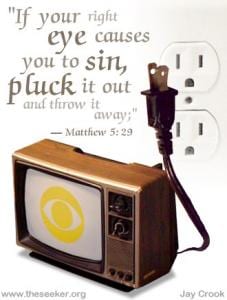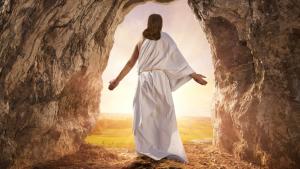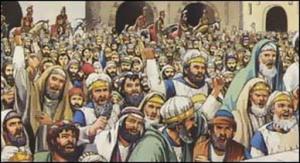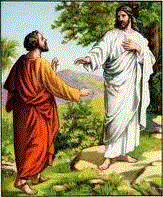
A priest in Madison, Wisconsin, got a laugh with the opening lines of his homily. He was preaching on the passage where Jesus recommends a startling new way to enter into life:
If your hand/foot/eye causes you to sin, cut it off/pluck it out. Better for you to enter into life [without them]. (Mark 9:43-48)
“That is why we Catholics do not always interpret the Bible literally,” the priest quipped.
I don’t suppose there are many Christians who do interpret this saying of Jesus literally. Typically, one says that Jesus was using a figure of speech to emphasize a point. It’s easy enough to ascribe moral lessons to the different body parts in Jesus’ saying:
- Hand – Don’t steal.
- Foot – Stop kicking the dog.
- Eye – Skip the Sports Illustrated swimsuit issue.
Matthew, in fact, puts this teaching in the context of the famous teaching where Jesus equates lustful glances with adultery. (Matthew 5:27-30) But Mark’s Gospel, which is Luke’s source, doesn’t have the saying about lust. Here it seems odd for Jesus to be wasting a perfectly good figure of speech on some fairly humdrum moral situations. Mark’s Gospel presents a Jesus dealing with more world-historical issues. Jesus over and over startles us into a new kind of thinking about the Kingdom of God.
Enter into life in a new kind of kingdom
In Mark Jesus seems to have something more in mind than urging his followers not to sin with hand, foot, or eye, no matter how colorfully he speaks. Mark’s context (9:33-41) for this saying is Jesus’ new teaching about greatness in the Kingdom of God. In particular, it’s not something the disciples should be arguing about. They shouldn’t imagine, either that they can prevent non-members of their group from driving out demons. God’s power can’t be limited that way.
Then comes the section with the saying about hand, foot, and eye and how to enter into life. My Bible titles it “Temptations to Sin.” (Mark 9:42ff) Curiously it starts not with a temptation that one might fall into but with something more aggressive: “Whoever causes one of these little ones who believe to sin.” I’m wondering if the “little ones” might include people who happen to be missing a hand, a foot, or an eye.
Here are three factors that make me think more than personal morality is animating the saying in Mark:
- First, a major theme in Mark’s Gospel is Jesus’ opposition to the political, religious, and economic establishment represented by the Temple in Jerusalem. It was a far more entrenched vehicle of sin than anything a hand, foot, or eye could accomplish.
- Second, Jesus spent a lot of time with maimed, crippled, and blind people, along with people experiencing many other problems.
- Third, Temple rules forbade entrance by anyone who was not “whole.” The lame, maimed, blind, etc. were not allowed in. (See 2 Samuel 5:8)
God’s love won’t be confined
I put these facts together with the real temptation the disciples struggle with, the temptation to exclude others and make comparisons among themselves. It makes me think Jesus is not dealing with three different sins his followers might fall into. The saying as a whole functions like a parable with one over-arching meaning: God: Stop trying to limit God’s love.
The Temple and the religious establishment it represented did that, and this Temple is doomed, in Jesus’ thinking. (Mark 13:2) A disciple who similarly tries to limit God’s love would be better off “if a great millstone were put around his neck and he were thrown into the sea.” (Mark 9:42)
Matthew’s Gospel has its own way of challenging the Temple’s restrictive policy:
Jesus throws the buyers and sellers out of the Temple and upsets the tables of the money changers. He quotes Isaiah 56:7 — “My house shall be a house of prayer” — and says they’ve made it a “den of thieves.” Just then the blind and the lame approach Jesus “in the Temple area,” where they weren’t supposed to be, and he cures them. (Matthew 21:12-14)
Jesus almost makes being blind or maimed or otherwise suffering a marker for preferred entry into his Father’s Kingdom. He had done so all along by his behavior. Now he does so in words. In the sphere of personal morality, we can’t take Jesus’ words about cutting off body parts literally. Jesus does not seriously want people to enter into life by injuring themselves. But on a political level his literal words are aimed directly at the Temple establishment’s disenfranchising of a large number of people, people whose company Jesus preferred.
Image credit: Heartlight via Google Images












